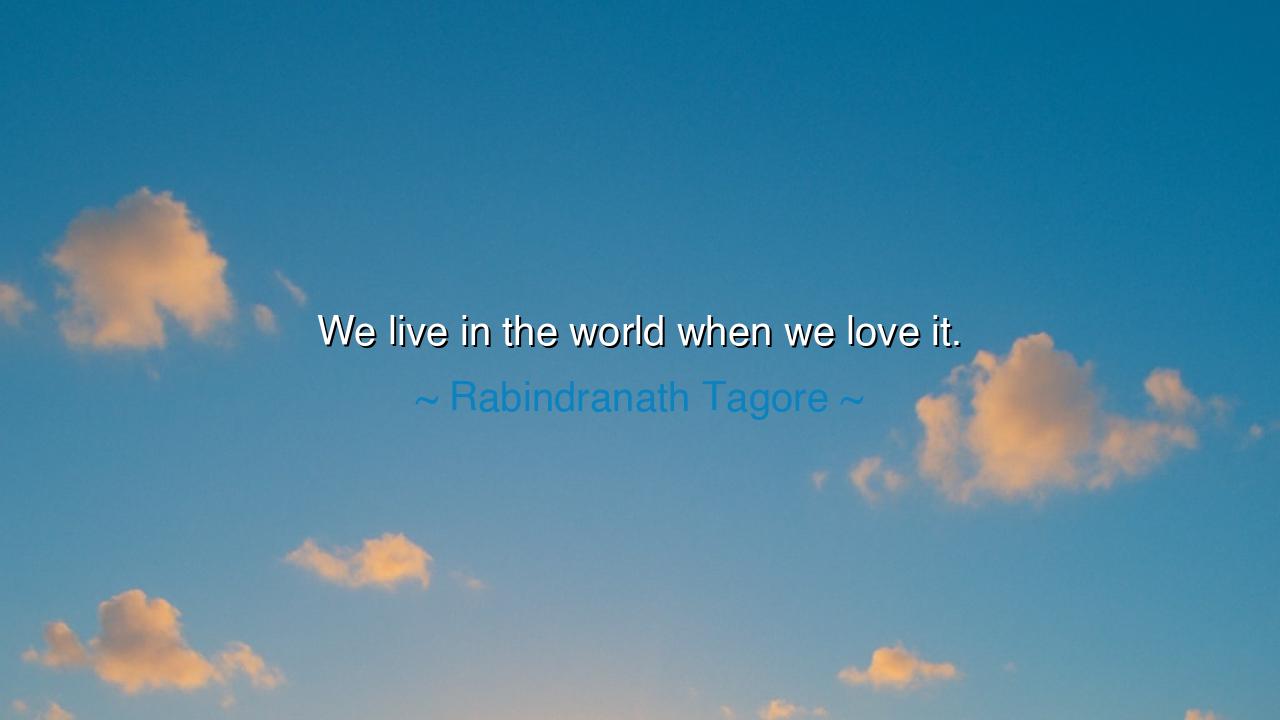
We live in the world when we love it.






"We live in the world when we love it." These words of Rabindranath Tagore echo a profound truth about the nature of existence, one that the ancients understood well: it is not enough to merely exist within the world; we must actively engage with it, cherish it, and love it. To live is to immerse oneself in the very essence of the world around us, not as mere observers but as participants in its beauty, struggles, and triumphs. Tagore, a poet and philosopher deeply in tune with the rhythm of life, invites us to realize that when we open our hearts in love for the world, we transcend our individual boundaries and connect to the greater whole.
In the wisdom of the ancient Greeks, we find a similar understanding in the teachings of Aristotle, who believed that true happiness comes not from detached contemplation, but from actively engaging in the world and contributing to the common good. Aristotle spoke of the good life—the life of virtue and engagement. For him, living fully meant loving and caring for the world around us, whether through cultivating relationships, contributing to society, or pursuing knowledge. He argued that only by loving the world and its inhabitants could one truly live, for love for others and the world itself is the foundation of a meaningful existence.
Consider the example of Siddhartha Gautama, better known as Buddha, whose journey toward enlightenment began with his deep love and compassion for all living beings. Buddha did not retreat from the world in fear or disillusionment; rather, he engaged with it, seeking to understand the suffering of others. His life teaches that to live in the world is to love it in all its imperfection. He found enlightenment not through avoidance, but by embracing the world with a heart full of compassion and a mind dedicated to understanding. Buddha’s life exemplifies that true living is not about separation or detachment but about love and connection to all beings.
The example of Mahatma Gandhi further illuminates Tagore’s insight. Gandhi, a man who loved his people and the land of India, led the nation’s struggle for freedom with a deep sense of love and nonviolence. His love for the land, the people, and their freedom transcended fear and hatred. Gandhi’s belief in the power of love transformed an entire nation, showing that when we love the world and those in it, we become agents of change. He proved that to truly live is to actively participate in the world’s struggles, not through force or indifference, but through the power of compassionate action.
In the modern world, we often find ourselves disconnected, caught in the bustle of daily tasks, too busy to stop and love the world around us. But Tagore’s words remind us that love is the thread that binds us to the world. In loving the world, we begin to see its beauty, its wonder, and its potential. We live when we choose to see the world with eyes full of appreciation and compassion, when we actively work to protect its natural wonders, to nurture our relationships, and to fight for justice. Without this love, we become passive observers, drifting through life without truly engaging with the very essence of what it means to be human.
The lesson from Tagore’s words is clear: love is not a passive feeling but an active force that connects us to the world and to each other. To live fully is to love deeply, to participate wholeheartedly in the beauty and complexity of existence. We must not wait for the world to come to us; we must move toward it with open arms, hearts full of love, and hands ready to build and nurture. Love for the world transforms our experiences, allowing us to find meaning in the smallest moments and in the simplest acts of kindness.
In practical terms, this means being mindful of how we engage with the world around us. We must nurture our relationships, whether with family, friends, or strangers, and care for the environment and the community. Love is a practice that can be found in everyday acts, from listening with empathy to offering help to those in need. By loving the world—actively and wholeheartedly—we find that we are living in the truest sense of the word. It is through this love that we transcend the mundane and step into a life filled with purpose, connection, and joy. Tagore’s wisdom reminds us that to live is to love—for only in loving the world can we truly experience the fullness of life.






AAdministratorAdministrator
Welcome, honored guests. Please leave a comment, we will respond soon